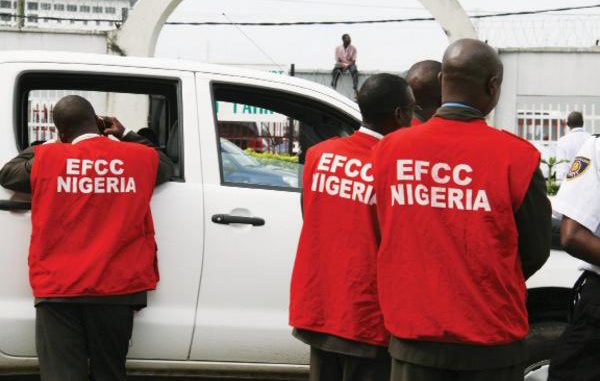
On a very lovely and fascinating day, I was randomly going through some of these random thoughts of some articulate public affairs’ commentators and one thing led to another, leading to my attention being drawn to one of these uniquely attractive claim made on the social media page of one of the most articulate upwardly mobile Nigerians. In it, this man listed out what he considered as the milestones of the previous administrations since the inception of democracy in 1999 made by the respective presidents.
In the column in which this writer made claims about the then president Olusegun Obasanjo between 1999 and 2007, he listed the establishment of the Economic and Financial Crimes Commission (EFCC) as one among the notable institutional achievements. True to his claim the establishment of EFCC is one of the most important national landmark achievements ever made by any administrations since the creation of Nigeria in 1960. This is because corruption and theft of public fund by government officials in Nigeria have combined to cripple the corporate progress of Nigeria and is the number one cause of mass poverty. The United Nations Office on Drugs and Crime (UNODC) as at the time Obasanjo was in office, had reeled out an estimate of $400 billion as the cumulative amount stolen by government officials since Nigeria started expiration of crude oil for exports in the last four decades. So the coming of that body to go after corrupt government officials past and present, remains a phenomenal achievement of all times.
The EFCC was set up pursuant to the EFCC ACT of 2004 which specifically in part II beginning from Section 6 allocated very important functions that the agency ought to carry out with the underlying objective of stamping out economic crimes from Nigeria’s body polity. In the Nigerian constitution in Section 15(5) the Nigerian State is charged to eliminate corrupt practices and abuse of office. That constitutes the constitutional background for the institutionalisation of the EFCC ACT.
Going through the entire gamut of the EFCC Act, the area that fascinates me so much is the Part II Section 6 (a) which specifies that the commission shall be responsible for the enforcement and due administration of the provisions of the Act. What the aforementioned purports is that the operatives and officers of this public institution for combating graft are obliged by law to adhere strictly to the due process of the law and must never become willing tools for witch hunt or politically motivated shadow boxing or war targeting perceived or even imaginary opponents of the appointing authority.
I said that this subsection tickles my fancy because it is the measure of the adherence to this provision by the operators of the agency that determines how objective they are regarding the implementation and enforcement of the provisions of the law against economic crimes.
The framers of this EFCC Act within the then executive council of the federation under Obasanjo were aware of the overwhelming tendencies of politicians to use law enforcement agencies to go after political opponents of the political party in power. However, this safeguard implanted within the EFCC Act has been flagrantly violated by the hierarchy over the years.
The inherent abuses of this legal safeguard has even resulted in a very damaging indictment of the EFCC under the current dispensation as contained in the latest global human rights report written by the government of the United States of America.This report repeated the often canvassed position in most critical quarters that EFCC has become too drawn to the politics of working for the political party in power.
The Americans reports thus: “Although ICPC and EFCC anticorruption efforts remained largely focused on low and mid-level government officials, following the 2015 presidential election both organizations started investigations into and brought indictments against various active and former high-level government officials. Many of these cases were pending in court. According to both ICPC and EFCC, the delays were the result of a lack of judges and the widespread practice of filing for the granting multiple adjournments.
“EFCC arrests and indictments of politicians continued throughout the year, implicating a significant number of opposition political figures and leading to allegations of partisan motivations on the part of the EFCC.”The report by the Americans continued thus: “In a case brought by the EFCC, in November a federal court convicted four firms allegedly used by a former aide of former president Goodluck Jonathan of laundering N1.67 billion ($5.3 million) in stolen funds. In its pursuit of corruption, the EFCC often did not observe all pertinent due process safeguards”.
“In November the Economic Community of West African States Court of Justice declared unlawful the arrest and detention in 2015 of former national security advisor Sambo Dasuki. A court ordered him released on bail in a case brought by the EFCC for the alleged diversion of N13.6 billion ($43.2 million) intended to purchase military material during the Jonathan administration. Despite the court order, he remained in detention.”
The general perception amongst a majority of Nigerians is that the EFCC under the current administration has become the attack dog of the party in power- All Progressives Congress. The EFCC has unleashed her fangs on mostly opposition figures such as serving governors and the National Assembly members and leaders who are perceived not to be subservient to President Muhammadu Buhari and most particularly, the EFCC has gone after the Deputy Senate president.
The Deputy Senate President Ike Ekweremadu has been a marked man since he emerged as deputy senate president in the hitherto, All Progressives Congress dominated senate against the official decision of president Buhari. Buhari has therefore voiced his determination to ensure that the deputy senate president is removed from office.
END

Be the first to comment